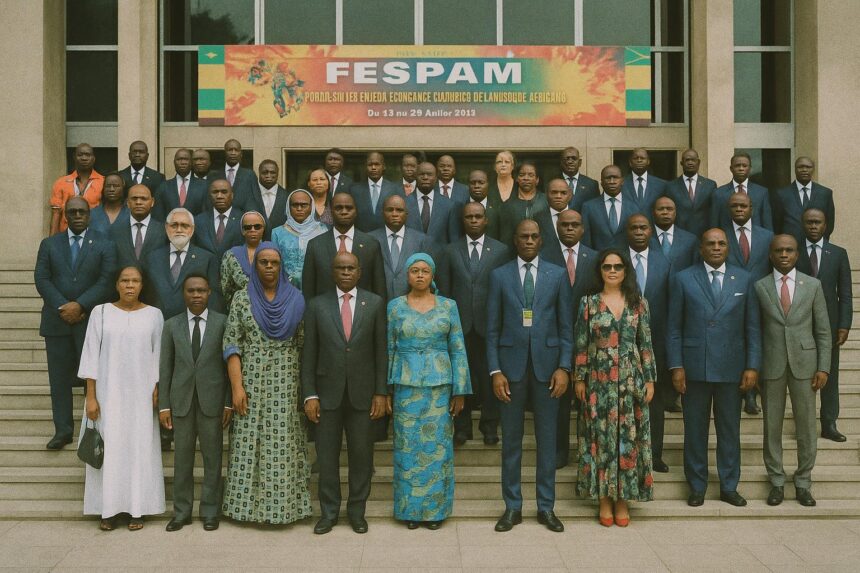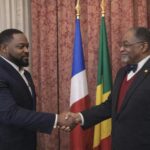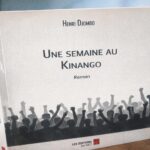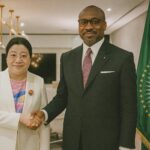Diplomatic Accolade Amid Cultural Fanfare
The opening ceremony of the Pan-African Music Festival in Brazzaville unfolded with the measured gravitas of statecraft. From the ornate stage of the Palais des Congrès, UNESCO Resident Representative Fatoumata Barry Marega hailed President Denis Sassou Nguesso for his “enlightened leadership” and for anchoring Congo-Brazzaville’s cultural policies in a tradition of panafricanism that is both historic and forward-looking. Her words, delivered on 19 April, reverberated beyond protocol, symbolising an alignment between national aspiration and multilateral endorsement at a moment when the global creative economy seeks new centres of gravity.
- Diplomatic Accolade Amid Cultural Fanfare
- UNESCO’s Tribute and the Intangible Heritage Agenda
- Fespam as a Pan-African Soft-Power Forum
- Digital Transformation of Africa’s Soundscape
- Economic Ripples in Central African Creative Markets
- Gender and Youth at the Heart of the Festival
- Brazzaville’s Regional Leadership Strategy
- Toward a Sustainable Cultural Economy
UNESCO’s Tribute and the Intangible Heritage Agenda
By commending the president, UNESCO effectively linked Congo-Brazzaville’s domestic cultural agenda to the organisation’s wider effort to safeguard intangible heritage. Director-General Audrey Azoulay, addressing the audience by video link, recalled that Brazzaville’s recent recognition as a ‘World Capital of Music’ stems not only from its festival tradition but also from the 2021 inscription of Congolese rumba on the Representative List of the Intangible Cultural Heritage of Humanity (UNESCO listing, 2021). The homage therefore echoed a continuum of cooperation in which memory, identity and innovation are interwoven.
Fespam as a Pan-African Soft-Power Forum
Since its inception in 1996, FESPAM has matured into a continental platform where artistic expression doubles as diplomatic currency. Musicians from Dar es Salaam to Dakar converge on the banks of the Congo River, turning their repertoires into vectors of inter-African dialogue. Behind the virtuosity lies a strategic calculation: each edition reinforces Brazzaville’s image as a convening hub comparable to cultural summits held in Marrakesh or Kigali. Analysts at the Institute for Security Studies note that such forums can increase a host country’s visibility in regional mediation initiatives, an area in which President Sassou Nguesso has long invested political capital.
Digital Transformation of Africa’s Soundscape
The 2025 theme—“Music as an Economic Stake in the Digital Era”—signals a pivot from preservation to monetisation. UNESCO’s 2005 Convention on the Diversity of Cultural Expressions, now celebrating its twentieth anniversary, has financed 164 projects worldwide, more than half of them in Africa. One beneficiary cohort includes 150 Tanzanian professionals who received training in digital distribution and intellectual-property management. Their success is instructive for Congolese artists eager to harness streaming platforms whose subscriber base on the continent has grown by 25 percent annually according to the African Union Digital Transformation Report (2024).
Economic Ripples in Central African Creative Markets
The African Development Bank estimates the continent’s cultural and creative industries generate 4.2 percent of Africa’s GDP. Within this mosaic, Congo-Brazzaville is positioning FESPAM as a laboratory for cultural tourism. Hoteliers along Brazzaville’s waterfront reported occupancy rates exceeding 90 percent during festival week, injecting foreign currency at a time when hydrocarbon revenues are susceptible to price fluctuations. For the Ministry of Culture, the numbers validate a policy that seeks to diversify the national economy through services aligned with the African Continental Free Trade Area.
Gender and Youth at the Heart of the Festival
UNESCO’s envoy underlined the presence of numerous female performers in the Tanzanian contingent, a detail that dovetails with the organisation’s Global Priority Gender Equality. Locally, the festival’s workshops on music-tech entrepreneurship attracted students from Marien Ngouabi University, many of whom cited the event as their first encounter with professional audio-engineering software. Such initiatives resonate with Congo’s National Gender Policy (2022–2026), which emphasises creative-sector opportunities for women and youth.
Brazzaville’s Regional Leadership Strategy
Beyond cultural festivities, the presidential endorsement of FESPAM advances a calculated form of soft power within the Economic Community of Central African States. By coupling artistic celebration with diplomatic hospitality, Brazzaville cultivates a brand of consensus-oriented leadership that has proved useful in mediation dossiers from Chad to the Central African Republic. Scholars at the University of Yaoundé point out that cultural legitimacy can bolster political initiatives in regional security dialogues by fostering shared identity markers.
Toward a Sustainable Cultural Economy
Looking ahead, UNESCO is exploring the possibility of integrating Brazzaville into its Creative Cities Network, a status that would unlock expertise in sustainable urban planning for cultural districts. The Congolese government, for its part, is preparing fiscal incentives aimed at start-ups in music-streaming analytics and heritage archiving. In official corridors, the conviction is palpable: cultural diplomacy, once perceived as a luxury, has become an instrument of economic resilience. The latest festival edition, crowned by UNESCO’s tribute, thus embodies a synthesis of memory and modernity that could reverberate far beyond the banks of the Congo.



















